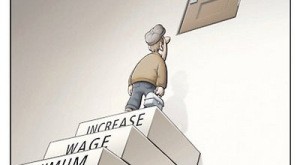Economics textbooks and minimum wages Suppose worker productivity rises so that workers can produce more per hour, and this causes the value of production to rise … According to the textbooks, worker pay should rise to reflect this increase, but that is not what has happened in recent decades. Instead, the lion’s share of the additional revenue has gone to the owners and managers of firms instead of to workers. The working class has not been able to bargain effectively and capture its...
Read More »Krugman’s textbook — mistaking the map for the territory
Krugman’s textbook — mistaking the map for the territory Paul Krugman has — together with Robin Wells — written an economics textbook that is used all over the world. As all the rest of mainstream economics textbooks, it stresses from the first pages the importance of supplying the student with a systematic way of thinking through economic problems with the help of simple models. Modeling is all about simplification … A model is a simplified representation of reality that is used to better...
Read More »Ceteris paribus — an alibi fairy
Ceteris paribus — an alibi fairy When applying deductivist thinking to economics, mainstream economists usually set up ‘as if’ models based on a set of tight axiomatic assumptions from which consistent and precise inferences are made. The beauty of this procedure is of course that if the axiomatic premises are true, the conclusions necessarily follow. The snag is that if the models are to be relevant, we also have to argue that their precision and rigour still holds when they are applied to...
Read More »Economic modelers — in need of a code of conduct
Economic modelers — in need of a code of conduct Auditors have a code of conduct because financial information is open to abuse and people rely on this information to make important decisions. Actuaries … have a code of conduct that includes context, basic rules and a declaration of fairness and accuracy. A consistent standard would be in the interest of the economic modelling industry and its reputation. We call on the government to develop a code of conduct to ensure the standard of all...
Read More »School choice — the elite illusion
School choice — the elite illusion The results reported here suggest that an exam school education produces only scattered gains for applicants, even among students with baseline scores close to or above the mean in the target school. Because the exam school experience is associated with sharp increases in peer achievement, these results weigh against the importance of peer effects in the education production function … Of course, test scores and peer effects are only part of the exam...
Read More »Mainstream economics — a wildly inconsistent project
Mainstream economics — a wildly inconsistent project In fact, most mainstream economists have never concerned themselves much with the workings of the economic systemm as a whole … The dominant concern, rather, has been, and remains, with highly specific or partial analyses of some highly restricted sectors or forms of behaviour … To the extent that it has ever been meaningful for the various disparate results or theorems of these economists to be considered as a whole, the clearest...
Read More »Top 10 theory of science books for economists
Top 10 theory of science books for economists • Archer, Margaret (1995). Realist social theory: the morphogenetic approach. Cambridge: Cambridge University Press • Bhaskar, Roy (1978). A realist theory of science. Hassocks: Harvester • Cartwright, Nancy (2007). Hunting causes and using them. Cambridge: Cambridge University Press • Chalmers, Alan (2013). What is this thing called science?. 4th. ed. Buckingham: Open University Press • Garfinkel, Alan (1981). Forms of explanation: rethinking...
Read More »Kulturrelativism? Nej tack!
En del badhus har separata badtider för kvinnor – bland annat Rosengårdsbadet i Malmö, som marknadsför ”enbart kvinnlig personal på plats och fönstren skyddas för insyn” … Skilda badtider. Skilda träningstider. Skilda lokaler. Valbart och frivilligt? Liberalt, alltså? Nej, faktiskt inte … Om hela badet stängs för alla av det ena könet när det andra badar så drabbas alla. Inte bara av att inte kunna bada just där och då, utan av att synen på det motsatta könet blir sned och jämställdhet...
Read More »London Calling
[embedded content]
Read More »Scandalous and dangerous economics
Scandalous and dangerous economics It cannot be denied that there is something scandalous in the spectacle of so many people refining the analyses of economic states which they give no reason to suppose will ever, or have ever, come about. It probably is also dangerous. Equilibrium economics … is easily convertible into an apologia for existing economic arrangements and it is frequently so converted. Frank Hahn
Read More » Lars P. Syll
Lars P. Syll









